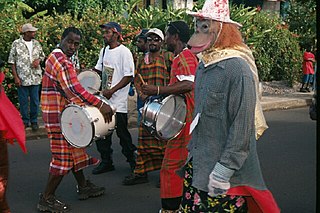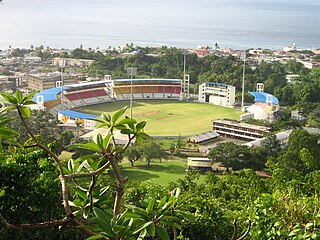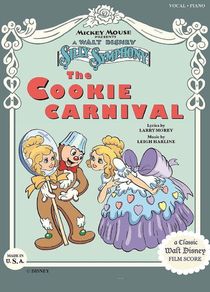The Real Mas, or the Dominica Carnival is a carnival held annually in Dominica. National festivities take place during which course a calypso competition, the Miss Dominica beauty contest and Miss Teen Dominica take place, amongst other events.

Carnival is a Western Christian festive season that occurs before the liturgical season of Lent. The main events typically occur during February or early March, during the period historically known as Shrovetide. Carnival typically involves public celebrations, including events such as parades, public street parties and other entertainments, combining some elements of a circus. Elaborate costumes and masks allow people to set aside their everyday individuality and experience a heightened sense of social unity. Participants often indulge in excessive consumption of alcohol, meat, and other foods that will be forgone during upcoming Lent. Traditionally, butter, milk, and other animal products were not consumed "excessively", rather, their stock was fully consumed during Shrovetide as to reduce waste. This festival is known for being a time of great indulgence before Lent, with drinking, overeating, and various other activities of indulgence being performed. For example, pancakes, donuts, and other desserts are prepared and eaten for a final time. During Lent, lacticinia and animal products are eaten less, and individuals make a Lenten sacrifice, thus giving up a certain object or activity of desire.
Soca music is a genre of music defined by Lord Shorty, its inventor, as the "Soul of Calypso", which has influences of African and East Indian rhythms. It was originally spelled "sokah" by its inventor but through an error in a local newspaper when reporting on the new music it was erroneously spelled "soca"; Lord Shorty confirmed the error but chose to leave it that way to avoid confusion. It is a genre of music that originated in Trinidad and Tobago in the early 1970s and developed into a range of styles during the 1980s and after. Soca was initially developed by Lord Shorty in an effort to revive traditional calypso, the popularity of which had been flagging amongst younger generations in Trinidad due to the rise in popularity of reggae from Jamaica and soul and funk from the United States. Soca is an offshoot of Calypso/Kaiso, with influences from East Indian rhythms and hooks.
Calypso is a style of Caribbean music that originated in Trinidad and Tobago during the early to the mid-19th century and spread to the rest of the Caribbean Antilles by the mid-20th century. Its rhythms can be traced back to West African Kaiso and the arrival of French planters and their slaves from the French Antilles in the 18th century.
The music of Guadeloupe encompasses a large popular music industry, which gained in international renown after the success of zouk music in the later 20th century. Zouk's popularity was particularly intense in France, where the genre became an important symbol of identity for Guadeloupe and Martinique. Zouk's origins are in the folk music of Guadeloupe and Martinique, especially Guadeloupan gwo ka and Martinican chouval bwa, and the pan-Caribbean calypso tradition.

The music of Dominica includes a variety of genres including all the popular genres of the world. Popular music is widespread, with a number of native Dominican performers gaining national fame in imported genres such as calypso, reggae, soca, kompa, zouk and rock and roll. Dominica's own popular music industry has created a form called bouyon, which combines elements from several styles and has achieved a wide fanbase in Dominica. Groups include WCK, Native musicians in various forms, such as reggae, kadans (Ophelia Marie, and calypso, have also become stars at home and abroad.
The music of the Lesser Antilles encompasses the music of this chain of small islands making up the eastern and southern portion of the West Indies. Lesser Antillean music is part of the broader category of Caribbean music; much of the folk and popular music is also a part of the Afro-American musical complex, being a mixture of African, European and indigenous American elements. The Lesser Antilles' musical cultures are largely based on the music of African slaves brought by European traders and colonizers. The African musical elements are a hybrid of instruments and styles from numerous West African tribes, while the European slaveholders added their own musics into the mix, as did immigrants from India. In many ways, the Lesser Antilles can be musically divided based on which nation colonized them.

The culture of Dominica is formed by the inhabitants of the Commonwealth of Dominica. Dominica is home to a wide range of people. Although it was historically occupied by several native tribes, it was the Taíno and Island Caribs (Kalinago) tribes that remained by the time European settlers reached the island. "Massacre" is a name of a river dedicated to the murders of the native villagers by both French and British settlers, because the river "ran red with blood for days." Each claimed the island and imported slaves from Africa. The remaining Caribs now live on a 3,700-acre (15 km2) Carib Territory on the east coast of the island. They elect their own chief.

Marie-Galante is one of the islands that form Guadeloupe, an overseas department of France. Marie-Galante has a land area of 158.1 km2. It had 11,528 inhabitants at the start of 2013, but by the start of 2018 the total was officially estimated to be 10,655, with a population density of 62.5/km2 (162/sq mi).
The Culture of Saint Lucia blends the influences of African, French, and English heritage. The official language of the island is English but Kreole, a form of French patois, remains an influential secondary language. The people are predominantly Catholic but the religious climate is tolerant.

Windsor Park is a multi-purpose stadium in Roseau, Dominica. It serves as the country's national stadium and is used mostly for cricket and association football matches. Other uses have included the World Creole Music Festival, the Finals of the Calypso Competition and the Miss Dominica pageant.
The Wizzard is a calypso musician from Dominica. He began performed in church as a young man, then competed in the carnival calypso tent in 1988, placing second. In 1989, he won the competition with "Feed My Brother" and "Young an' Restless"; that year, he also placed second at the Independence Calypso competition. He retained his Calypso King title in 1990, as well as placing second representing Dominica at the Caribbean Broadcasting Union Song Festival.

The Antiguan Carnival is a celebration of the emancipation of slavery in the country held annually from the end of July to the first Tuesday in August. The most important day is that of the j'ouvert, in which brass and steel bands perform for much of the island's population. Barbuda's Carnival, held in June, is known as Caribana. The Antiguan and Barbudan Carnivals replaced the Old Time Christmas Festival in 1957, with hopes of inspiring tourism in Antigua and Barbuda. Some elements of the Christmas Festival remain in the modern Carnival celebrations.
Batabano is the name of the Caribbean Carnival held in the Cayman Islands. The festival takes place annually during the first week of May in George Town. Batabano is a time for people of all different descents to gather with a common interest and celebrate community spirit. The Cayman Islands are home to over 100 different nationalities, all brought together and embraced by the festival. It is a cultural celebration filled with music, dance, and elaborate costumes that reflect the landscapes, heritage, and culture. International interest is growing in the Batabano celebrations, despite only having existed for about 30 years.

As an overseas départment of France, Martinique's culture is French and Caribbean. Its former capital, Saint-Pierre, was often referred to as the Paris of the Lesser Antilles. The official language is French, although many Martinicans speak a Creole patois. Based in French, Martinique's Creole also incorporates elements of English, Spanish, Portuguese, and African languages. Originally passed down through oral storytelling traditions, it continues to be used more often in speech than in writing.
Chanté mas and Lapo kabrit is a form of Carnival music of Dominica. It is performed by masquerading partygoers in a two-day parade, with a lead vocalist (chantwèl), who is followed by the responsorial chorus (lavwa), with drummers and dancers dancing backwards in front of the drummer on a tambou lélé. The Carnival has African and French roots and is otherwise known as Mas Dominik, the most original Carnival in the Caribbean.
Unburnable is a 2006 novel written by Antiguan author Marie-Elena John and published by HarperCollins/Amistad. It is John's debut novel. Part historical fiction, murder mystery, and neo-slave narrative, Unburnable is a multi-generational saga that follows the African Diaspora in the United States and the Caribbean, offering a reinterpretation of black history. John was an Africa Development specialist in New York City and Washington, D.C. prior to turning to writing. Since publication of Unburnable, she has worked with the United Nations, currently serving as Senior Racial Justice Lead at UN Women.
Tourism in Dominica consists mostly of hiking in the rain forest and visiting cruise ships.

The Cookie Carnival is an animated short produced by Walt Disney Productions and originally released May 25, 1935. It is a Cinderella story involving a cookie girl who wishes to be queen at the cookie carnival, and a homage to the Atlantic City boardwalk parade and bathing beauty contest of the 1920s and 1930s. Contrary to the claim in Film Superlist: 1894-1939, the film is not in the public domain as its copyright was renewed in 1964. It will enter the public domain in 2031 in accordance with current copyright laws.
Miss Dominica Queen is a national Beauty pageant in Dominica.